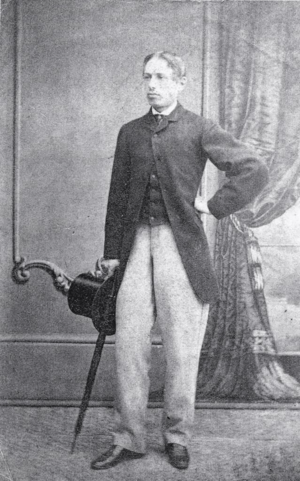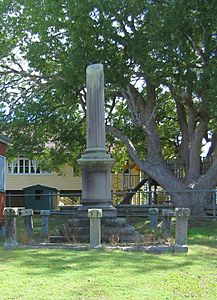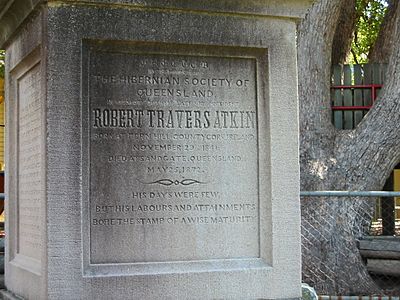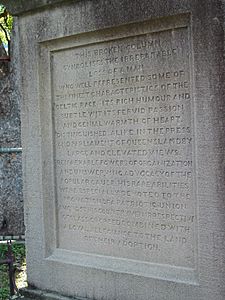Robert Travers Atkin facts for kids
Quick facts for kids
Robert Travers Atkin
|
|
|---|---|
 |
|
| Member of the Queensland Legislative Assembly for Clermont |
|
| In office 1 October 1868 – 29 January 1869 |
|
| Preceded by | John Scott |
| Succeeded by | Oscar John De Satge |
| Member of the Queensland Legislative Assembly for Member for East Moreton |
|
| In office 17 February 1870 – 7 March 1872 Serving with Henry Jordan
|
|
| Preceded by | Arthur Francis |
| Succeeded by | Samuel Griffith |
| Personal details | |
| Born | 29 November 1841 Fernill, Clonakilty, County Cork, Ireland |
| Died | 25 May 1872 (aged 30) Sandgate, Queensland |
| Spouse | Mary Elizabeth Ruck |
| Relations | Baron Atkin (son) |
| Occupation | Journalist, Newspaper editor, Newspaper proprietor |
Robert Travers Atkin (born November 29, 1841 – died May 25, 1872) was an important person in early Queensland, Australia. He was born in Ireland and became a newspaper editor and a politician. He served as a member of the Queensland Legislative Assembly, which is like a state parliament.
Contents
Early Life and Move to Australia
Robert Travers Atkin was born in Fernhill, County Cork, Ireland. His parents were William Francis Atkin and Alice Hungerford. In 1864, he married Mary Elizabeth Ruck. Soon after, they moved to Australia.
They first planned to start a sheep farming business. However, Robert had a bad fall from a horse. Because of his injury, they moved to Brisbane. There, Robert began a new career as a journalist and later became involved in politics.
Robert and Mary had three sons in Brisbane. In 1871, Mary took their children back to her mother's home in Wales.
Working as a Newspaper Editor
Robert Atkin became the editor of a newspaper called the Brisbane Guardian. An editor is in charge of what goes into a newspaper. He later left this job because he disagreed with some of the newspaper's ideas.
After leaving the Guardian, Robert started his own newspaper. He partnered with W. C. Belbridge to create the Queensland Express in August 1868. However, this newspaper only lasted for less than three years.
Becoming a Politician
On October 1, 1868, Robert Atkin was elected to the Legislative Assembly of Queensland. This is the main law-making body for the state of Queensland. He represented the area called Clermont.
Later, on February 17, 1870, another politician named Arthur Francis resigned. This created an open spot for the East Moreton area. A special election, called a by-election, was held to fill the spot.
Robert Atkin was one of two candidates for the East Moreton seat. The other candidate was Robert Cribb. During their speeches, Atkin made some strong statements about Cribb. Cribb defended himself and then decided to withdraw from the election. This meant Robert Atkin was the only candidate left. He was then declared the winner and became a member of the Legislative Assembly again.
Robert Atkin did not finish his term for East Moreton. He resigned on March 7, 1872. He had to leave his job because he was very sick with a lung disease called pulmonary tuberculosis.
Later Life and Legacy
Robert Atkin passed away in Sandgate, Queensland on May 25, 1872. He was only 30 years old. He asked to be buried in Sandgate, on a hill where he enjoyed sitting and looking at Moreton Bay. He was buried in his military uniform.
He left money in his will to help build a church near his grave. This church was the first St Margaret's church in the area. A monument was also built to remember him. It was put up by the Hibernian Society of Queensland, where he was a leader.
Years later, the monument needed repairs. Robert's son, James Atkin, Baron Atkin, sent money to fix it. In February 1937, special carvings were added to St Margaret's Church in his memory. These carvings were created by an artist named Daphne Mayo. The Governor of Queensland, Leslie Wilson, helped to show them to the public.
Robert Travers Atkin Memorial
 | Jewel Prestage |
 | Ella Baker |
 | Fannie Lou Hamer |




